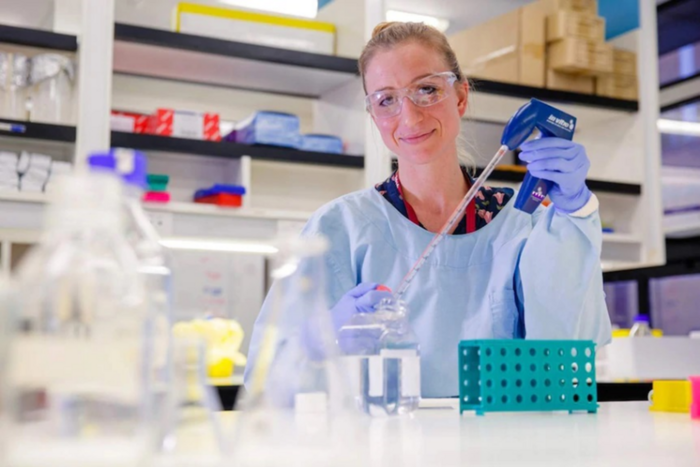SARS-CoV-2 causes a broad range of clinical symptoms, including potentially fatal acute respiratory distress syndrome (ARDS). A study published August 1 in the open access journal PLOS Biology by Kirsty Short at University of Queensland, Queensland, Australia, and colleagues suggests the nasal epithelium (the lining of the nose) of children inhibits infection and replication of the ancestral strain of the SARS-CoV-2 virus and the Delta variant, but not the Omicron variant.

Credit: The University of Queensland (CC-BY 4.0, https://creativecommons.org/licenses/by/4.0/)
SARS-CoV-2 causes a broad range of clinical symptoms, including potentially fatal acute respiratory distress syndrome (ARDS). A study published August 1 in the open access journal PLOS Biology by Kirsty Short at University of Queensland, Queensland, Australia, and colleagues suggests the nasal epithelium (the lining of the nose) of children inhibits infection and replication of the ancestral strain of the SARS-CoV-2 virus and the Delta variant, but not the Omicron variant.
Children have a lower COVID-19 infection rate and milder symptoms than adults. However, the factors driving this apparent pediatric resistance to COVID-19 infections are unknown. In order to better understand lower infection and replication of ancestral SARS-CoV-2 virus in children, researchers obtained samples of primary nasal epithelium cells (NEC) from twenty-three healthy children aged 2-11 and fifteen healthy adults aged 19-66 in Australia. They exposed the cells of adults and children to SARS-CoV-2 and then observed the infection kinetics and antiviral responses in children compared to adults.
The researchers found that ancestral SARS-CoV-2 replicated less efficiently and was associated with a heightened antiviral response in the nasal epithelial cells of children. This lower viral replication rate was also observed with the Delta variant, but not the more recent Omicron variant. The study had several limitations however, including a small sample size, so future clinical studies will be needed to validate these preliminary findings in a larger population and to determine the role of other factors, such as antibodies in protecting children from SARS-CoV-2 infection. Additionally, pediatric protection from emerging variants has yet to be quantified.
According to the authors, “We have provided the first experimental evidence that the pediatric nasal epithelium may play an important role in reducing the susceptibility of children to SARS-CoV-2. The data strongly suggest that the nasal epithelium of children is distinct and that it may afford children some level of protection from ancestral SARS-CoV-2.”
Short adds, “We use nasal epithelial cells from children and adults to show that the ancestral SARS-CoV-2 and Delta, but not Omicron, replicate less efficiently in pediatric nasal epithelial cells.”
#####
In your coverage, please use this URL to provide access to the freely available paper in PLOS Biology: http://journals.plos.org/plosbiology/article?id=10.1371/journal.pbio.3001728
Citation: Zhu Y, Chew KY, Wu M, Karawita AC, McCallum G, Steele LE, et al. (2022) Ancestral SARS-CoV-2, but not Omicron, replicates less efficiently in primary pediatric nasal epithelial cells. PLoS Biol 20(8): e3001728. https://doi.org/10.1371/journal.pbio.3001728
Author Countries: Australia
Funding: This work is supported by the Australia Research Council (Discovery Early Career Researcher Award DE190100565 to M.J.), The National Health and Medical Research Council (Project grant APP2010917 to F.A.M. and G.B.; Senior research Fellowship APP1155794 to F.A.M; APP1124612 to LL; 2010757 to KYC and LL; NHMRC investigator grant 2007919 to K.R.S.) the Australian Infectious Diseases Research Centre (COVID-19 seed grant to A.A.K) and Academy of Finland and COVID19 research donations (Grant 318434 to G.B.). This program has in part been funded by the Western Australian Future Health Research & Innovation Fund. The funders had no role in study design, data collection and analysis, decision to publish, or preparation of the manuscript.
Competing Interests: I have read the journal’s policy and the authors of this manuscript have the following competing interests: KRS is a consultant for Sanofi, Roche and NovoNordisk. The opinions and data presented in this manuscript are of the authors and are independent of these relationships.
Journal
PLoS Biology
DOI
10.1371/journal.pbio.3001728
Method of Research
Experimental study
Subject of Research
Cells
Article Title
Ancestral SARS-CoV-2, but not Omicron, replicates less efficiently in primary pediatric nasal epithelial cells
Article Publication Date
1-Aug-2022
COI Statement
The authors of this manuscript have the following competing interests: KRS is a consultant for Sanofi, Roche and NovoNordisk. The opinions and data presented in this manuscript are of the authors and are independent of these relationships.




